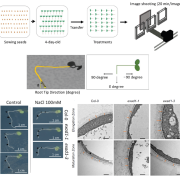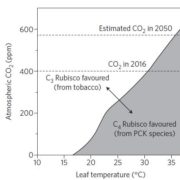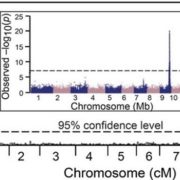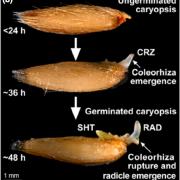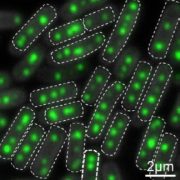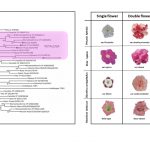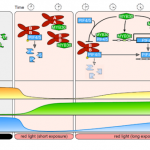Endosidin20 targets the cellulose synthase catalytic domain to inhibit cellulose biosynthesis (Plant Cell)
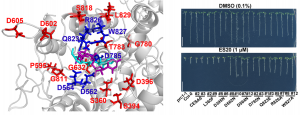 Cellulose is an indispensable component of plant cell wall formation. Cellulose is synthesized at the plasma membrane by a cellulose synthase complex (CSC) made up of at least 18 monomeric cellulose synthases (CESAs). In this study, Huang et al. used a chemical genetic approach to explore the structure and function of the cellulose synthase complex. Endosidin20 (ES20)-treated seedlings have shorter, swollen roots, with reduced cell length and increased width reminiscent of roots of CESA mutants and plants treated with cellulose synthsis inhibitors. Chemical-genetic screening from EMS mutagenized population for ES20 resistant lines identified 15 alleles with missense mutations in CESA6. These mutated amino acids are in the conserved regions of all Arabidopsis CESAs and reside in the catalytic cytoplasmic domain, where both ES20 and UDP-glucose phosphonate are docked based on structural model and molecular docking. Furthermore, ES20 impairs CSC (cellulose synthase complex) trafficking dynamics, based on Fluorescence Recovery After Photobleaching (FRAP) assay. The link between catalytic activity and trafficking remains to be explored, but this study has generated a new inhibitor and mutants that will be useful research tools. (Summary by Arif Ashraf) Plant Cell 10.1105/tpc.20.00202
Cellulose is an indispensable component of plant cell wall formation. Cellulose is synthesized at the plasma membrane by a cellulose synthase complex (CSC) made up of at least 18 monomeric cellulose synthases (CESAs). In this study, Huang et al. used a chemical genetic approach to explore the structure and function of the cellulose synthase complex. Endosidin20 (ES20)-treated seedlings have shorter, swollen roots, with reduced cell length and increased width reminiscent of roots of CESA mutants and plants treated with cellulose synthsis inhibitors. Chemical-genetic screening from EMS mutagenized population for ES20 resistant lines identified 15 alleles with missense mutations in CESA6. These mutated amino acids are in the conserved regions of all Arabidopsis CESAs and reside in the catalytic cytoplasmic domain, where both ES20 and UDP-glucose phosphonate are docked based on structural model and molecular docking. Furthermore, ES20 impairs CSC (cellulose synthase complex) trafficking dynamics, based on Fluorescence Recovery After Photobleaching (FRAP) assay. The link between catalytic activity and trafficking remains to be explored, but this study has generated a new inhibitor and mutants that will be useful research tools. (Summary by Arif Ashraf) Plant Cell 10.1105/tpc.20.00202


